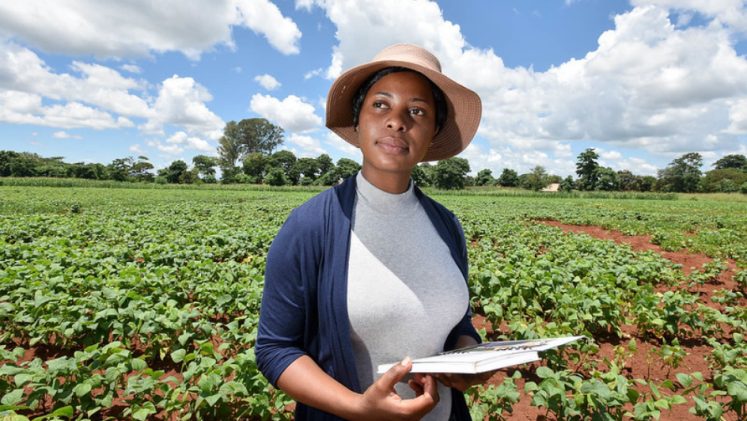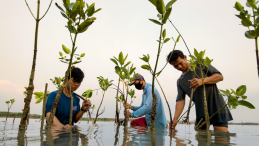Youth are amongst the most vulnerable to climate change and will have to deal with its long-term consequences. Even as young people across the globe show enthusiasm and commitment to climate action, they often remain excluded from decision-making. Therefore, it is essential to involve youth as stakeholders, and to engage them at all stages of governance.
To help achieve this, the Impulsouth project aims to encourage climate leadership among young entrepreneurs and innovators from the Global South, with a particular focus on Africa and Latin America. Through its leadership training course and solutions lab, the project equips early-career professionals with knowledge on climate ambition cycles and entrepreneurial skills to develop climate solutions aligned with the goals of the Paris Agreement.
The current “Global Stocktake” will conclude at COP28, where parties will take stock of their progress regarding their actions toward Paris Agreement objectives. Providing countries in the Global South with increased means to enhance and implement their Nationally Determined Contributions (NDCs) is key. By providing support, mentoring and access to funding, Impulsouth empowers project participants to actively contribute to meeting their countries' climate targets.
The project splits participants into two tracks: policy and innovation. For those interested in the first, the solutions aim to strengthen government capacities. For those interested in the latter, solutions take on an entrepreneurial approach. Nevertheless, solutions must contribute towards building resilient societies and adapting to climate change in their countries.
The first cohort of young professionals started their journey with Impulsouth in 2022. Over the course of six months, 40 participants were able to expand their knowledge and skills in climate governance, innovation, monitoring and reporting, financing and project development. The first phase began with online courses, and after that participants entered the Climate Solutions Lab where they identified and developed concrete solutions under the theme “Transition to a resilient society with net-zero carbon emissions.” Simultaneously, they prepared their projects to be pitched for entrance into the “incubation programme” for the actual development of their solution.
During this six-month programme, 12 candidates from Latin America and Africa received further support in the form of a seed grant, continued mentoring/coaching and access to makerspaces.
“Impulsouth gave me a good understanding of the climate ambition cycle and of the stakeholders involved. This knowledge was indispensable in implementing a solution which fit my career and addressed the need of the health sector’s adaptation in Niger,” says Dr. Noura Zeinabou, who created the Center of Education and Research on Health and Climate Change (CERSCC-Magaria) for research, training, and advocacy for health professionals in the Sahel region.
Capacity-building programmes such as Impulsouth are vital in supporting young professionals to develop their skills. However, it takes that a step further, as knowledge-sharing is a key component of lasting success. Therefore, the project promotes south-south cooperation to strengthen capacities between Africa and Latin America. A strong network has formed where participants can exchange information and experiences to learn from one another.
This unique approach has proven fruitful. Take for instance the work of Philippa Hamakasu from Zambia, who created a project on carbon market viability for small scale producers in forestry and agricultural sectors in rural districts of her country. “The creation of markets for carbon trading is key for the development of new ‘cleaner’ energy options, as well as in stimulating more environmentally appropriate industrial and corporate practices,” she says. “With Impulsouth, I was able to address a critical gap in my community. The support and collaboration empowered me to make a difference and create a lasting impact."
Other projects include beekeeping for forest protection, organic waste collection in Santo Domingo, Dominican Republic and a community-based laboratory for soil management in Uganda. Some participants have been recognized for their work already. Rocio Silva of Guatemala was recently named to the Forbes Top 100 Women in Central America. Her project is on plastic waste management in the Hawaii-AUMH coastal marine protected area, a mangrove forest off the Pacific coast of her country.
“Our entrepreneurial curriculum that combines online courses, innovation masterclasses, online incubation, mentorship and seed grant has been the driver of success so far,” says Emmanuel Cheo of UNU-VIE’s Pan African Cooperation and Educational Technologies (PACET) division, who is a member of the projects Steering Committee. “A new cohort of 44 participants recently started and we are already looking forward to the projects they will be creating.”
Impulsouth is carried out by a consortium of partners across Africa and Latin America. To learn more, click here. For an overview of the 2022 participants and their projects click here.


